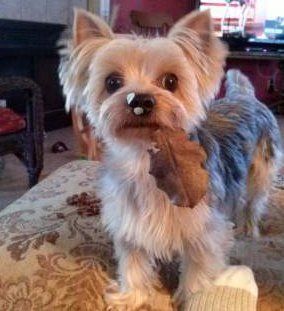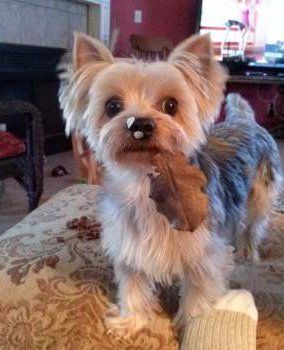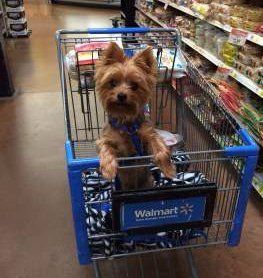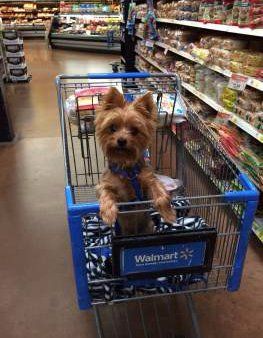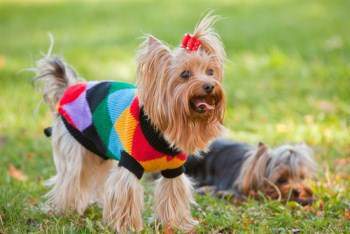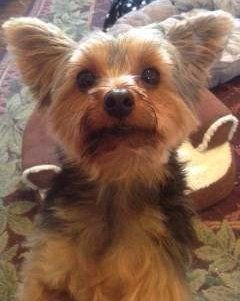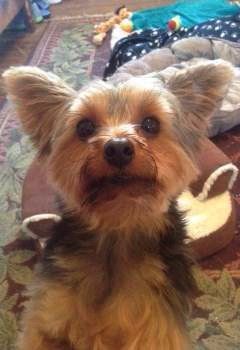Yorkie Traits
Overview
One element that becomes clear with purebreds is that when bloodlines are kept strong and breeding is done over such a long period of time without intermingling other breeds...genetics and profiles of character and traits remain even and predictable. This allows for each breed to have not only their own distinct appearance, but also to have set behavior that will be expected.
Therefore, one can predict the basic personality and traits of a purebred Yorkshire Terrier.
We have an entire section dedicated to behavior and temperament...This
section is to dive a bit deeper into some of the traits that one may notice with their puppy or dog...And to address certain quirks that have been known to show up with this toy breed dog. We will offer advice for some of the questions you may have...And discuss what is normal, what is not... And training tips for certain situations.
Please note:
YorkieInfoCenter is reader-supported, and some of the product suggestions on this page are affiliate links. As an Amazon Associate we earn from qualifying purchases. This is at no extra cost to you and helps us continue providing free, high-quality information.
Does Your Yorkie Tend to be Shy?
Since each dog will have their own personality, some quite, some sociable... Let’s first discuss how to know if a Yorkie is technically shy. This can be a trait with some.
A technically shy dog will show physical indicators. You will see that the ears
will lie back against their head, the pupils may become dilated, the dog may pant when there is no apparent reason (this is done to reduce stress in an what seems to be an overwhelming situation for him or her), slip its tail between its legs and shun all eye contact with people.
There is training for this, to give the dog self confidence in what seems to be an intimidating environment. The best way to help is to show your dog that there is nothing to be shy about.
Never console him or her....This will lead the dog to believe that they have valid reasons for being timid. It is best to pay no attention to your dog’s shy behaviors. Go about your business with a cheerful tone. Demonstrate to your dog that “all if just fine”. If at any time, he or she shows behavior of interest or curiosity with the trigger that caused the timid behavior, … praise your dog as if they just did the most wonderful thing in the world. Give treats, talk in a happy, proud tone, and give a nice pat.
If your dog is predominantly introverted when guests visit, you will want to use desensitize training. This can be done by having a friend come over for just a minute per day. Add to the time very gradually over the course of a number of weeks. Each time your dog behaves very wary, pay no attention to them. Remember: If you feel bad and give hugs and kisses, you will be encouraging the behavior and not helping. Whenever your Yorkshire Terrier comes over to the visitors, perhaps to take a small treat from them, reward their actions with great praise, pats and kisses.
In the end, your Yorkie will begin to make the association that you are composed and in high spirits and they will begin to mimic your conduct.
Deacon
Photo courtesy of Sally Papin
Your Yorkie will also begin to discover that: Getting passed the reluctance and allowing themselves to show interest in things = treats, praise and pats and that being shy = nothing fun at all!
Last but not least, the more that dogs experience, the more confident they will be. A dog who is inside for the majority of the day, will frequently show nervous behavior traits when confronted with the outside world. For a dog to be especially outgoing, they must have a wide range of outside stimulus. He or she should be brought to many locations and meet many people and animals. This makes a Yorkie become more outgoing and slowly yet progressively become well behaved..as they will learn how to react to different situations.
Cappy Gagliano, 6 years old
Photo courtesy of Hilda Gagliano
Bring your dog to the park, stores (many stores allow pets inside, just be sure that your Yorkie is up-to-date on all shots before being in the company of other animals and other stores allow toy and small breed dogs if you have him in a sling carrier or tote bag...
If in a tote bag be sure to allow your Yorkie to be able to pop their head out to see what is going on !), hiking (in new places so that your dog can experience new smells and new interesting features), for car rides, meet for play dates with your neighbor’s dog, take walks on different paths and do not repeat the same route every day, play Frisbee in the park one day and play catch in your friend’s yard the next.
The more that a dog sees the world, the more he will feel safe in that world.
Primarily remember it can take some time for a Yorkshire Terrier to be poised and self-confident. It is a gradual process.
See Also:
How Much Sleep is Normal?
When a Yorkie sleeps quite a bit, it is normal for owners to wonder if this is a trait or if something is amiss.
It is normal for a Yorkie to sleep more than their human family members. How much is normal? In general, 13 hours per day for an adult... Up to 18 for a puppy. However even 17 hours is not considered above of the norm for a Yorkie. Those that are very active will need more rest...And those that do not receive enough stimulation can become bored and will have a tendency to nap more. A dog has 2 types of sleep, just as humans do. The first one is a light sleep and the other is the deeper sleep ( commonly known as REM - Rapid Eye Movement...and they do dream).
It is the REM deep sleep that allows a dog to rest its body and wake up feeling rejuvenated. Yorkies, as with most dog breeds, wake much more often than we do during their deep sleep phase. You may not even notice that he or she wakes up for just a minute or so and then begin snoozing again. However, because of this, a dog must sleep much longer than we do, to receive all the deep rest that is needed and have their body & mind refreshed.
Rolling around in the Grass
In general, this behavior is very normal and instinctual. If your Yorkie does this frequently, you should first inspect your dog for any signs of health concerns that would cause your dog to feel extremely itchy and have an irresistible need to scratch.
Rolling on the grass may be your puppy or dog's way of scratching their back or any areas that are irritated. Everything from food allergies to laundry detergent allergies… to flea bites to skin infections can cause severe itching.
First, look for any signs of this.
Lift up the hair of your Yorkie
and check the skin. Look for any areas of:
* Redness
* Swelling
* Sores
* Bumps
If you do see any, you should have your dog's veterinarian to perform tests to help find the cause. You may also wish to read our Allergies
section.
If your dog does not have any skin issues, you can rest assured that rolling around on the grass is completely normal for a dog. If you find that this dog behavior is getting your Yorkie too dirty and you wish for your dog to control their admiration of the grass...you can brush your dog 3 to 4 times per day...this will copy the feeling that the dog receives when rolling in the grass, the dog’s "back will be scratched" and may minimize outside actions.
Note: Odd Behavior? Fussy Eating? Puzzling Barking?
We cover it all in our book! Learn More
Over Excitement and Hyper Activity
There are many Yorkshire Terrier owners concerned about their dogs showing excess excitement. This happens more commonly with puppies; however dogs of any age can have this issue if they never have learned how to control themselves. This can be seen at specific times, such as over-reaction to your arrival at home...Or he or she may have trouble relaxing and remaining calm all throughout the day (or night). This causes two main physical signs:
- Excitement Urination
- Hyperventilating
If your Yorkie hyperventilates, please be sure to first have your dog given a full medical checkup. Kennel Cough and other respiratory health issues
can appear to be hyperventilation. In some cases, hyperventilation can be caused by a rapid allergic reaction that will need immediate medical attention.
Excitement Urination may be mistaken for a dog having a bladder infection or other health issues. These must be ruled out before attributing this to excitement behavior.
If your Yorkie is 100% healthy, you can then begin to deal with this as a behavioral issue.
A dog can hyperventilate and/or urinate when they become very excited, seemingly unable to control their emotions which can lead to a temporary loss of bladder control. Some dogs, the Yorkshire Terrier is undoubtedly one of the breeds, becomes overexcited very readily. You can help your Yorkie when your dog hyperventilates by partially covering his mouth, so that they breathes back in a bit of carbon dioxide, just as humans do when breathing into a paper bag.
You can determine the trigger. Does your Yorkie urinate when you come home? Does he get over excited when you are getting ready to go for a car ride? It is another sort of strange behavior that has a trigger?
Once knowing what the trigger is, you can then begin to train your Yorkie to become used to those situations, at a measured and steady pace, so that your dog becomes so accustomed to the source, that it no longer causes them to lose control.
For example, if your dog gets very excited when you come home from work, you can incorporate some training by coming in and out of the door. Every time you come in, do not greet your dog. (Yes, it is tempting, but do not do it). Just check you messages, pick up the clutter in the living room or do some activity that is quiet and takes 1 to 2 minutes.
Then, kneel down and in a very calm and soothing voice, greet him or her.
Do not go overboard with cuddles and kisses. Just gently give a pat and say hello in a calm voice. Once they is used to you being there, you can then begin to play more actively and give more hugs.
Excitement Urination can often be cured by following these techniques; however in some cases it is a matter time, as a very young puppy grows a bit older and haves stronger bladder muscles. While this training will most certainly help any dog be happy, as they will learn control and stability, urination may be fixed with time, as your Yorkie grows.
More Yorkshire Terrier Information
Introduction to Home, Family & Other Dogs
Fixing the 9 Reasons a puppy barks
Odd Eating Habits
24 Behavioral Issues
34 Yorkshire Terrier Health Issues....And so Much More
The only Yorkie book you'll ever need. Available in both Print & eBook.
You may also like:
How to Socialize a Yorkie
- The elements that a dog should be socialized to and exact training methods to do it.
Do Yorkies Get Along with Cats
- How most Yorkshire Terriers react to cats and tips to having both together under one roof.

